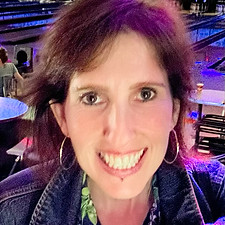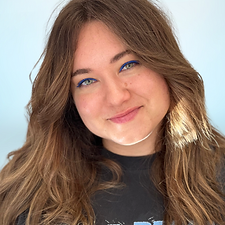
Friday, September 26- Saturday, September 27, 2025
In-Person Symposium
Encino, CA
9:00 - 9:30 AM Registration, Coffee & Networking
9:30 - 9:45 AM Opening Remarks
9:45 - 11:15 AM Presentation
11:15 - 11:30 AM Break (Coffee & Exhibit Hall)
11:30 - 1:00 PM Presentation
1:00 - 2:00 PM Lunch & Networking with Exhibitors
2:00 - 3:30 PM Presentation
3:30 - 3:45 PM Break (Coffee & Exhibit Hall)
3:45 - 4:45 PM Panel Discussion or Case Consultation
We will be offering CE's. We will have more information regarding the number of available CE's will be coming soon!
Friday, September 26, 2025
Keynote
9:45 AM - 11:15 AM
Erased: A Primer on Working with Adoptees & The Overlooked Trauma of Adoption
Adoptees are a marginalized group with higher rates of mental health issues, yet few providers have adoption competency. Because adoption begins with loss, adoptees often face lifelong struggles with grief, identity, and self-esteem. Rebecca, a domestic infant adoptee, will share her lived experience and professional insights on treating adoptee populations. This presentation covers adoptee specific vocabulary, sources of oppression, barriers to care, and relevant frameworks, including the Seven Core Issues in Adoption, the Adoptee Consciousness Model, and Adoption Literacy. Adoption-competent, trauma-informed care should be essential training for clinicians, as adoption impacts millions in the U.S. (Lee Small, 2025).
11:30 AM - 1:00 PM
Chemical Desire, Ethical Dilemmas: Exploring Moral Injury in Sexualized Drug Use
Chemical Desire, Ethical Dilemmas: Exploring Moral Injury in Sexualized Drug Use examines the complex intersection of substance use, sexual behavior, and moral injury. This presentation delves into the psychological and ethical consequences individuals face when drug driven sexual experiences lead to regret, shame, or a fractured sense of self. Through research, case studies, and discussion, we explore how altered states impact decision-making, consent, and personal values shedding light on the hidden costs of drug driven pleasure-seeking behaviors.
Has This Profession Failed Therapists: Unpacking Imposter Syndrome Myths and Building Competence
Imposter syndrome is often framed as a personal struggle, but what if the real issue is the system? This dynamic talk challenges the myths surrounding imposter syndrome and explores how the mental health field can reinforce self-doubt, unrealistic expectations, and burnout among therapists. Instead of blaming individuals, we’ll examine structural problems—lack of mentorship, perfectionism, and toxic professional norms—that fuel this comfort. Attendees will gain new insights and practical strategies to navigate their careers with more confidence.
2:00 PM - 3:30 PM
Ethical Integration of Reiki in Clinical Practice for Sexual Trauma
This presentation empowers mental health professionals to ethically integrate Reiki into psychotherapy, particularly in trauma healing. It explores the alignment between Reiki and clinical theories, providing a framework for ethical application within professional scope. Participants will gain insight into legal considerations, informed consent, documentation, and best practices for blending Reiki with traditional therapeutic modalities. Rooted in neuroscience, trauma research, and ethical compliance, this training bridges energy psychology with clinical practice, equipping therapists with a holistic, trauma-informed approach while maintaining professional integrity.
Ethics in Practice of Addiction Treatment & Clinical Supervision
This presentation explores ethical principles in addiction treatment and clinical supervision, emphasizing integrity, professional boundaries, and confidentiality. It covers the Code of Conduct, ethical decision-making models, and strategies for addressing ethical dilemmas. Key topics include cultural humility, patient rights, and the continuum of care in addiction treatment. Attendees will gain insights into ethical maturity, supervision best practices, and compliance with legal and professional standards. Led by David Cohen, LCSW, this session provides practical guidance for maintaining ethical excellence in counseling and supervision, ensuring the highest standards of care for individuals in recovery.


Rory Slikker and Brittanie Ramos
3:45 PM - 4:45 PM
Business Development Culture
Business Development Culture: a panel discussion where we will explore Driving Business, Mentorship, and Community featuring industry experts on each subject.
PANEL:
Saturday, September 27, 2025

Andrew Sarver, LMFT
Keynote
9:45 AM - 11:15 AM
Ride the Third Wave: Discovering Which Behavioral Therapy Is The Best Fit For You
This presentation dives into third-wave behavioral therapies—innovative approaches like ACT, DBT, and FAP that prioritize mindfulness, acceptance, and values-driven action over rigid symptom control. We’ll unpack how these methods foster psychological flexibility, helping individuals engage authentically with life’s challenges. By spotlighting real-world applications (from chronic pain to emotional dysregulation) and contrasting them with earlier CBT models, the talk highlights their focus on context, relationships, and holistic well-being. Whether you’re a clinician or curious learner, you’ll leave with a nuanced understanding of how these therapies blend science and humanity to transform mental health care. Let’s rethink healing together.

Charity L. Simpson, LPC, NCC, CETS
11:30 AM - 1:00 PM
Discover the Power of the Social Atom – A Tool with Endless Potential
Join us for an engaging session on the Social Atom, a dynamic and adaptable tool developed by J.L. Moreno, the father of psychodrama. This powerful visual method maps out an individual’s most significant relationships—including people, places, things, and activities—revealing the quality, distance, and dynamics of these connections. Participants will receive step-by-step guidance on constructing a Social Atom and engage in hands-on practice using various methods, including pen and paper, art materials, objects, and auxiliaries. Through personal creation, demonstrations, and real-world examples, participants will explore ways to tailor this tool to meet diverse client needs at all stages of treatment. By the end of the session, attendees will have a clear understanding of the Social Atom’s applications and be equipped to integrate it into both personal and professional practice.
%20-%20Norman%20Kim.png)
Norman Kim, PhD
Embedding Equity And Social Justice Into Clinical Practice: Identity, Authenticity, and Allyship.
Systemic discrimination has pervasive impacts on those suffering from mental health conditions as well as those engaged in trying to alleviate that suffering. A stance of clinical neutrality and an individualistic focus are not only inadequate, they are harmful. We explore the urgent need within our professions to address the systemic nature of barriers to accessing care, stigma, lack of representation among providers and mistrust of providers who do not possess an adequate understanding of cultural factors. We will explore structural and institutional, as well as interpersonal, manifestations of discrimination essential for an equitable and social justice based foundation to our work.
2:00 PM - 3:30 PM
I Graduated Now What…. Navigating Your Clinical Career After Graduation
Are you a recent graduate unsure of your next career steps? I Graduated, Now What? Navigating Your Clinical Career After Graduation is designed to help you transition from student to successful clinician with confidence. This presentation will provide practical strategies to identify career opportunities, importance of identifying a niche, explore multiple streams of income, and set yourself up for long-term success. You’ll learn how to balance client care with self-care and maintain a fulfilling career path. Join us and gain the tools to take the next step in your clinical journey with clarity and purpose.

Tessa Gordon, Licensed Marriage and Family Therapist #113307, RYT
Breaking the Rules — To Break Free
Traditional therapy norms often fail to match the intensity of an eating disorder. This workshop invites clinicians to examine when and how to break the “rules” of therapy—ethically and strategically—to truly help clients recover. Learn how to challenge outdated clinical assumptions, embrace direct engagement, and use radical permission as a tool for dismantling the eating disorder’s control. Through case studies and experiential exercises, participants will leave with a bold, unapologetic approach to helping clients break free.

Rachel McMurray, LMFT
3:45 PM - 4:45 PM
Case Consultation: How to best support neurodivergent clients - specific to ADHD, ASD and Personality Disorders.
It can be challenging and simultaneously incredibly rewarding working with this population. I am here to share my experience and offer a space for creating interventions and managing any countertransference.





.png)

.jpg)
.jpg)


